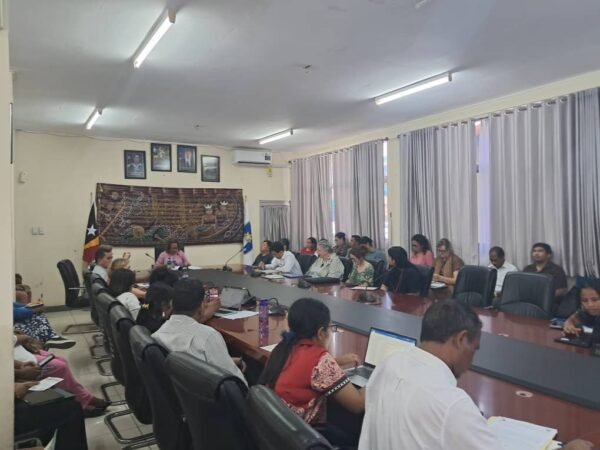Dili, November 11, 2025 (Média Democracia) – The Ministry of Education (ME), together with development partners from the United Nations Educational, Scientific and Cultural Organization (UNESCO) and the United Nations Children’s Fund (UNICEF), held a discussion on the Multilingual Education Program (EMULI), aimed in improving the quality of education through the use of local languages to teach children basic concepts such as numeracy and literacy before introducing official languages.
According to the Minister of Education, Dulce de Jesus Soares, the meeting brought together the ministry and partners who have been supporting the implementation of the Multilingual Education Program, with the objective of presenting a baseline study conducted by the EMULI team, which will serve as a reference for the Ministry of Education.
“In 2026, we will begin implementing EMULI in 62 schools, so it is important to first establish a baseline of data. After two years, we can measure progress. We cannot rely only on stories; we need solid data,” said Minister Dulce at the Ministry of Education in Vila Verde, Dili.
The Minister further explained that before the program resumes, researchers will first conduct field research to collect data.
“Some pilot programs have already started this year, but before expanding further, researchers will conduct studies so that the Ministry can gather baseline data. This will allow us to compare progress between 2025 and 2027,” she added.
Development partners supporting the EMULI program include UNESCO, UNICEF, CARE International, and the World Bank, which has also shown interest in providing assistance.
The EMULI program aims to improve students’ learning outcomes and facilitate their understanding of official languages. Evidence shows that when children learn in their mother tongue, they can recognize and comprehend concepts faster, making it easier to later learn second languages such as Portuguese and Tetum.
Minister Soares emphasized that the program’s approach is based on global research demonstrating that using a child’s first language in early education leads to better comprehension and stronger literacy outcomes in additional languages.
The program has already been implemented in the municipalities of Lautém, Manatuto, and the Special Administrative Region of Oe-Cusse Ambeno (RAEOA), and will continue to expand to other schools. The local languages currently used in the program include Fataluku, Galolen, and Baikeno, all of which have shown positive progress.
Meanwhile, the EMULI Goodwill Ambassador, Cristry Sword Gusmão, expressed her pride in the program’s achievements.
“I never imagined we would reach this point, implementing a program in three original languages with such significance, while also introducing new languages to local communities,” said Cristry Sword Gusmão.
The ambassador highlighted one of the main challenges faced by the program is the quality of teachers. This issue, she said, is not limited to a few schools but is widespread across the country.
She underlined that teacher training must be a top priority, along with the development of new teaching materials and basic literacy resources. This is an important opportunity to update and strengthen the program’s progress, and she is confident that with everyone’s continued support, EMULI will succeed.
Report by: Tomas
Photo by: Tomas

